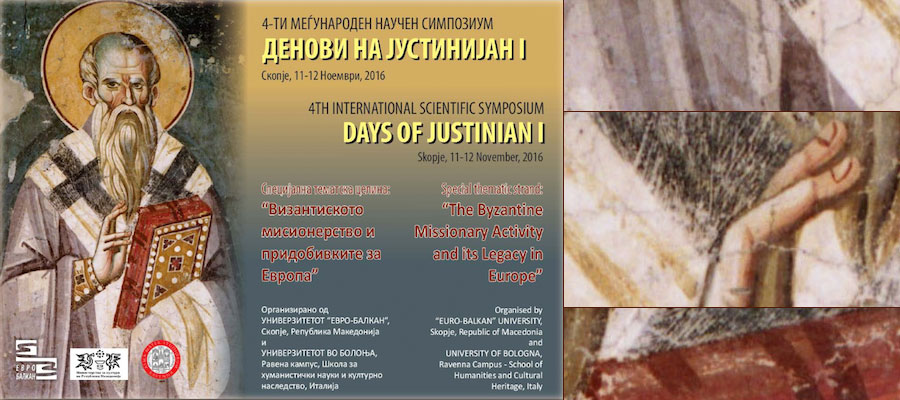4th Days of Justinian I, Skopje, November 11–12, 2016
The international scientific symposium “Days of Justinian I” is an annual interdisciplinary scholarly forum aimed at the presentation of the latest research followed by discussions on various aspects of Byzantine and Medieval Studies, that include the treatment and interpretation of cultural, historical and spiritual heritage in contemporary Europe. The symposium is dedicated to Emperor Justinian I with the aim to address a broad range of issues related to Byzantium and the European Middle Ages, comprising the exploration of the cultural and historical legacy as an integrative component of the diversities and commonalities of unified Europe.
This year the International Symposium “Days of Justinian I” chose a special thematic strand “The Byzantine Missionary Activity and Its Legacy in Europe,” commemorating 1100 years since the death of St. Clement of Ohrid. St. Clement’s missionary activity in Macedonia, grounded on the perseverance of the tradition of Constantine-Cyril and Methodius, demonstrates the complexity of the religious and cultural interactions and the profound impact of the missionary work. Consequently, the missions of Cyril and Methodius received almost no attention in Byzantine sources, while our knowledge of St. Clement’s work is originally based on Byzantine worldview. This notion is relevant both to medieval and contemporary times, implying the intricacies in the interpretation of the missionary initiatives and their importance in legitimizing the political and ideological projects. Aside from competing claims, the recurrent appropriation of the traditions arising from the illustrious missionaries from the Middle Ages left a fundamental legacy that transcends the national and cultural borders of Europe.
The missionary activity as a universal phenomenon embraces broader issues, geographical areas and chronological scope. Тhe symposium will address the diverse contours of this phenomenon, exploring various aspects of religion, politics, ideology, identity, ethnicity, literary and artistic expression, political and cultural memory reflected in the historical and cultural legacy.
Papers are welcomed on various topics that may include, but are not limited to the following areas of discussion:
- The concept of the Apostolic mission
- Interpreting the missionary activity of the apostle Paul
- Byzantine and Western missions compared
- Christianization and the concept of barbarism
- The conversion of Europe: From Paganism to Christianity
- Missionary enterprises beyond the frontiers: Cultural interaction between East and West
- Monasticism and missionary work
- Missionary, war and diplomacy
- Missionary and strategies of distinction
- The Missions of Ss. Cyril and Methodius: Reconstructing the cultural routes in Europe
- Interpreting the missionary work of St. Clement of Ohrid: Medieval and Modern context
- Saints and Missionaries
- Legends and oral traditions
- The Political Uses of the Medieval Past
- Ideological expression of Byzantine and Medieval art
- Music and liturgical practices
- Literary Receptions of the Middle Ages
- Heritage politics and the perception of the Past
- Preserving the cultural heritage: Restoration and protection
- The messages of medieval visual narratives
- The representation of Byzantium in material culture: Medieval and modern concepts and approaches
Papers are limited to 10 minutes in length. Working languages: Macedonian, Italian and English.
Symposiarch: Professor Mitko B. Panov
